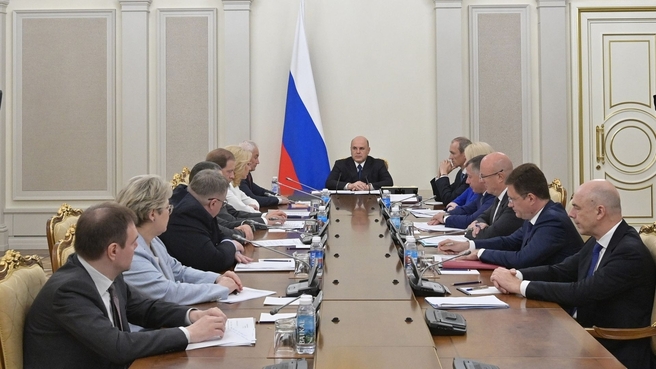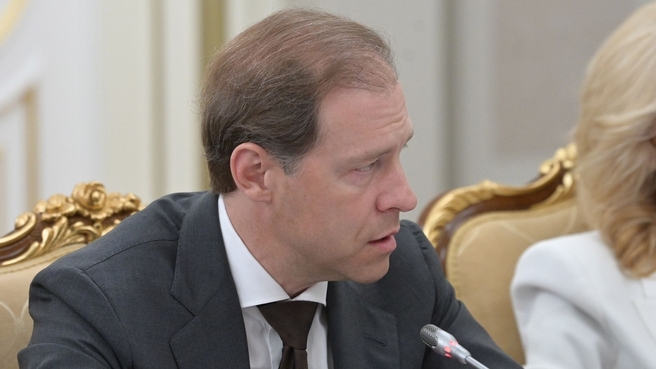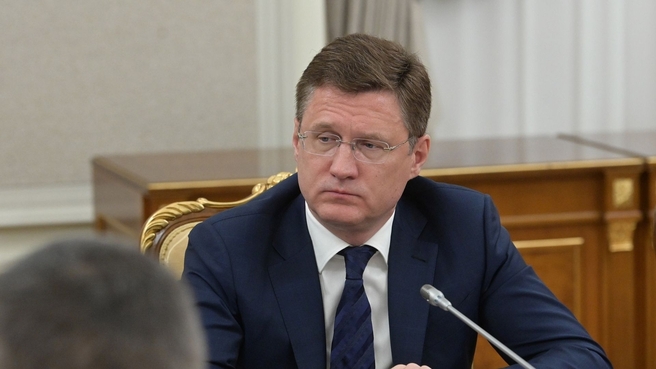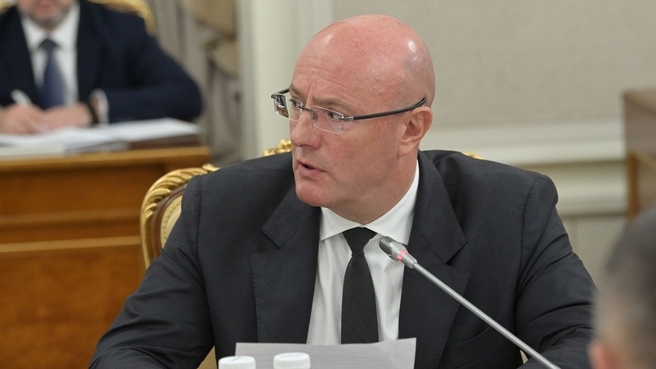Agenda: developments in the economy and the social sphere; support for the development of the aircraft industry; fast-tracking the procedure for issuing decisions on industrial products that have no analogues in Russia; support for gardeners using domestic seedlings; and additional funding for the purchase of medicines for benefit recipients.
Mikhail Mishustin’s opening remarks
Mikhail Mishustin’s closing remarks
Excerpts from the transcript:
Meeting with deputy prime ministers on current issues
Mikhail Mishustin: Colleagues, today Russia is living through an important period of its history. As noted by the President, the entire military, economic and information machine of the West is aimed against us. In fact, we are fighting for the right to choose our own path, guided by our national interests, for the prosperity of our nation.
The main goal in these conditions is to ensure the sovereignty and independence of the country, as well as the safety and welfare of the people. It is essential to consolidate society for this. We should act together, as one team, closing the ranks around our President, preserve our forces’ unity, and make tailored joint decisions for the effective execution of the tasks set by the President.
The country has recently faced another challenge. An attempt was made to destabilise the internal situation in Russia. Government members were at their workplaces. Under the President’s leadership, they acted clearly, in a coordinated manner, and maintained stability at all levels in order to prevent the situation from deteriorating and to protect people from all possible threats that might arise.
Colleagues, I would like to ask you to report on how the work in your areas was organised. We have maintained constant contact.
Mr Belousov, let us begin with you. Please, you have the floor.
Andrei Belousov: I will start with the situation with the banks, with the demand for currency and cash.
Demand increased in about 15 regions by about 30 percent. The highest growth in demand for cash was recorded in the southern regions – the Voronezh, Rostov and Lipetsk regions, in the largest cities. Demand in these areas increased by 70-80 percent. But owing to the smooth work of the Bank of Russia and its currency reinforcement support (that has grown by about three times), there were absolutely no disruptions in the normal situation. All cash machines worked as usual and demand started decreasing on Sunday. Now the situation is fully stabilised.
There was also some increase in retail trade, mostly in the southern regions. According to some retailers, the demand increased by 10-15 percent in the Rostov Region, by 30 percent in the Lipetsk Region and 50 percent in the Voronezh Region. But there was no real disruption in trade, either. There was enough inventory, a big enough reserve. Pricing information is currently being compiled. Information on this will be ready this evening, but judging by the initial data, everything has been stable so far, nothing unusual is being reported. Inventories will last from two weeks to a month, so as a whole, absolutely everything is under control.
The main problem is the situation on the roads. A Ministry of Transport command centre started operating on Saturday. A centre was also established in Avtodor. I must say that our colleagues from Avtodor acted very promptly.
By 8 am on Sunday, the asphalt was restored and the traffic on the M-4 motorway, the Don road, began to be restored stage-by-stage starting at 1 am on Sunday. Now traffic is fully restored although there is still some congestion.
The railways and air transport continue operating in normal mode. The only problem is that delays have affected some people. Now we have started working with the airlines to make rebooking automatic. The airlines are meeting passengers halfway. We have been working consistently at this as well.
Mikhail Mishustin: Yes, Mr Savelyev reported on assistance for passengers with discounted or even free tickets. The Ministry of Transport is taking many measures to this effect.
Mr Khusnullin, please take control of the restoration of the roads and related facilities. We have been in touch; I know you are already dealing with this.
Ms Golikova, what has been done in your area?
Tatyana Golikova: Mr Mishustin, colleagues.
All medical and social organisations are working in a routine mode, including in Rostov-on-Don, the Voronezh, Lipetsk and Tula regions and the new regions of Russia. No restrictions were recorded.
Thirty-eight mobile medical teams, including 26 ambulance teams and 12 disaster medical crews operated on the roads with limited traffic.
Mobile Health Ministry teams have been and continue working in a normal mode in the new regions of the Russian Federation. Employees from the Health Ministry, Rospotrebnadzor, and the Federal Medical-Biological Agency (FMBA) are working in the flood area after the destruction of the Kakhovka Hydroelectric Power Plant in the Kherson Region. The FMBA has not recorded any incidents with Energodar.
Pensions, allowances and social benefits have been and are being paid in full. Territorial branches of Rospotrebnadzor, the Compulsory Medical Insurance Fund and the Social Fund have been working normally during this period. There have been no incidents. There is no shortage of medications at pharmacies or medical institutions. The reserves of the majority of vital medications will last for 10-12 months.
The Ministry of Education and the Ministry of Culture have ensured coordination of actions with the regional departments, subordinate institutions, federal children’s centres and children’s summer recreation organisations.
Graduation events scheduled for Saturday were postponed in the regions where the counterterrorism operation was introduced. At present, the holding of graduation events on 1 July is under review. Graduation events took place in the other regions. Everything was normal in this respect as well.
Security measures have been toughened at children’s health camps, especially those in southern Russia.
Youth Day took place on Saturday, with some restrictions in individual regions. About 1.4 million people attended the events; there were 5 million views. Everything went without a hitch, despite the scale of the events.
In accordance with the endorsed schedule of the State Final Examination, today, 26 June is a reserve day for holding exams in Russian language for the 9th form and in basic and profile mathematics for the 11th form.
A decision to postpone exams was made in Moscow alone. School students will have an opportunity to take exams on other reserve days – 30 June and 1 July for the 9th form and 1 July for the 11th form.
Moscow-based higher educational institutions were advised today to postpone exams or hold them remotely. Exams are taking place as usual in all other regions of the Russian Federation.
I would like to say that our youth and the employees of our organisations have supported the President.
Mikhail Mishustin: Thank you. This is the case indeed.
Mr Manturov, you were dealing with trade and defence industry issues, among other things. Mr Belousov gave us a brief account, but I would like to ask you to also talk about the issues of retail networks that you and I discussed on Saturday and Sunday. Go ahead, please.
Denis Manturov: Mr Mishustin, colleagues.
Industrial and trade companies operated smoothly over the weekend. Despite the emergency, no incidents were allowed. An operational command centre was established at the Ministry of Industry and Trade to resolve any arising question. The heads of 10 southern regions, key companies, and large and medium retail networks took part in this remotely.
Tougher security measures were taken at industrial facilities and defence industry companies. Special supervision was established over organisations that operate under the risk of a technogenic emergency. The National Guard of Russia was involved in this measure. Evacuation teams were prepared in the event of an aggravation of the situation.
An unfailing supply of basic necessities was the main goal of retail trade. In some cases we recorded a heightened demand for some goods, in part, in the Rostov Region, Rostov-on-Don and the Voronezh Region.
We instructed our colleagues not to impose restrictions on sales. We already have experience in this area. There was no need for any restrictions because our networks have continuously kept long-term reserves of socially important goods since the start of the pandemic.
We worked with the regions on routes for bringing products in from large distribution centres. I would like to praise the effective work onsite. We quickly mapped out alternative logistics when roads were blocked. We had plans for these new routes just in case, but we did not use them.
Now all work in my section has gone back to regular mode. I would like to thank my colleagues – this well-planned communication and coordination system demonstrated its ability to respond to and counter such unconventional challenges.
Mikhail Mishustin: Thank you, Mr Manturov.
Mr Novak, please inform our colleagues about the situation, including with gasoline prices, and with your areas in general.
Alexander Novak: Mr Mishustin, colleagues,
Last weekend, the Russian fuel and energy complex was operating normally. There were no major technical disruptions that could significantly affect the operation of the fuel and energy complex.
No accidents were recorded in the Rostov, Lipetsk or Tula regions. In the Voronezh Region, four technical violations were recorded in the electric power industry which resulted in a power disruption for about 1,800 people. The next day, the system was restored and consumers had electricity.
Also, there was one technical violation in the oil industry in the Voronezh Region: a fire at the Krasnoye Znamya plant at the Federal Reserve. This fire was contained and extinguished within a day and did not affect energy distribution or oil product supplies in any way either.
The demand for oil products is being fully met. Over the weekend, there was an increase in demand at gas stations in the southern regions, especially in the Rostov Region. At the same time, the gas stations were fully stocked with oil products. There were no interruptions in supply. Prices are also stable. Today we will continue monitoring and working in this area. Stocks of petroleum products will last more than 15 days, which corresponds to the average multi-year values for this period.
Production of the main energy products – oil products, coal, oil and gas production – is running as planned. Measures were taken to strengthen the antiterrorism security of fuel and energy facilities. The access control system was enhanced on the weekend. The staff on duty was adjusted to 24-hour operation.
Interaction was organised with the operational services, as well as officials in the fuel and energy organisations in their headquarters mode at the Ministry of Energy, who are authorised to address these security issues.
We also concentrated on strengthening the security of critical information infrastructure.
In general, I would like to say once again that everything is as normal. The fuel and energy complex continues to operate normally. We are preparing for the fall/winter season. The necessary reserves have been accumulated, necessary repairs are being carried out.
Mikhail Mishustin: Thank you. Mr Chernyshenko, please.
Dmitry Chernyshenko: Colleagues, Mr Mishustin, in line with your instructions, and in accordance to the response rules, 24-hour monitoring of telecommunications networks and critical infrastructure facilities was introduced promptly. Everything has been operating as usual since June 24, no serious communications problems have been recorded.
Russian Post branch offices are working normally, including receiving shipments in the southern regions. The restrictions on branches in the Rostov Region introduced earlier have now been lifted.
The Ministry of Digital Development, Communications and Mass Media promptly ensured the technical ability to receive calls from the 122 service area. The line received 2,500 calls on June 24, which is 70 percent higher than usual.
Dialogue and the National Priorities non-profit organisation, including Объясняем.рф (explanations), promptly informed people of the latest developments, including on the restrictions introduced in several regions. Updates continue, fakes items are being investigated, and false information is refuted.
Public sports events in the regions where the counterterrorist operation regime was introduced are being resumed.
The schedule for some competitions has been adjusted. They are being moved to other dates. Fans have been updated.
Restrictions on sporting events in all regions have been lifted at the federal level. Regional restrictions are in effect on a region by region basis.
In Moscow, and the Moscow and Voronezh regions, restrictions were introduced at universities: there was an online submission of applicants’ documents, via the Admission to the University Online super service.
I would like to note that since the admission campaign began, 188,000 applications have been submitted across the country, including 131,000 through the super service.
Rectors can decide how to hold exams: postpone them or hold them remotely.
As the counterterrorist operation regime was lifted, universities in these regions will operate as usual starting tomorrow.
In other regions, admissions and examination committees functioned as usual.
The Ministry of Economic Development created a response centre with representatives of the tourism industry.
There were no sharp fluctuations in prices for accommodation or flights within the country.
Traffic on the M-4 highway, as Mr Belousov said, resumed as normal. So, tourism volumes are consistent.
We organised feedback from the regions. They provided recommendations on how to assist people as much as possible if there is any penalty when a tour is cancelled. But there were no company-wide refusals; decisions were made on an individual basis.
Due to many requests from people and industry representatives, the booking period for train tickets to the south has been increased to 90 days for some routes just this week.
We continue to monitor all these issues.
Colleagues, I want to thank you for your work. Please continue to do everything you need to do to ensure the smooth operations of the areas you oversee and the execution of the President’s instructions. All decisions should be coordinated and balanced. And above all, our absolute priority is the well-being of our people, our citizens.
Now over to other topics. Last week I paid a working visit to Tatarstan. We discussed the situation in the region in detail with the Head of the Republic, including the situation in the social sphere and in the economy. We visited the Gorbunov Kazan Plant, one of the largest aircraft manufacturing facilities in Russia, and saw how the production was organised. We made a tour of the assembly shops and visited construction sites. They are using the most advanced and unique know-how. They are also using high-capacity electron-beam welding equipment, vacuum annealing furnaces, and other advanced technologies. The plant employs highly skilled specialists – we also talked to them. All of this allows us to create reliable, high-quality machines that are needed in our economy.
I talked to Tu-214 pilots, who called this aircraft a most reliable plane. We also discussed the requirements that apply today, including to new modifications of this model.
We held a separate meeting on aircraft construction projects. This industry needs special support, given the external pressure it is exposed to. It is important to boost the output of Russian-designed aircraft and reduce our dependence on imports. We have every opportunity to do this.
Last year, on the President’s instructions, we drafted and approved a comprehensive development programme for this strategically important sector. Within this framework, 18 months from now, in 2025, the Kazan plant must increase production of the Tu-214 to ten airliners annually. I would remind you that these narrow-body long-haul aircraft are equipped entirely with domestic components and will be supplied to airlines to replace their foreign equivalents. The necessary planning for this is currently underway.
However, the potential of this plant and the needs of our carriers, as we have repeatedly discussed, are much greater. By agreement with the President, we decided to allocate an additional 42 billion roubles from the National Welfare Fund to enable the plant to start building 20 aircraft a year. The money will be used to retool, expand production capacities, and train personnel. Mr Manturov, my colleagues and I have discussed all of this in detail.
We need to prepare and ensure strict compliance with the timeframes and quality standards of aircraft building. Mr Manturov, please keep this work under your personal control.
We are also continuing to help other companies adapt to the sanctions. There is a range of support measures for Russian companies that organise and increase production.
As the President emphasised, the importance of the domestic market does not mean that we should just focus on it, because this would lead to self-isolation and loss of competitiveness.
This is why we will make it easier for importers to supply multi-component technical equipment for large investment projects, which is not yet produced in the Russian Federation. Now it will be possible to obtain this equipment in several batches rather than in just one batch, as before. That is much more convenient where the case in point is importing machine tools and automatic lines, which can arrive in batches over quite a long period of time – up to six years. And their inclusion on the list of industrial products that have no domestic equivalent will allow Russian companies to avoid paying value added tax in this case.
We have also made it possible for small and medium-sized businesses to reduce the cost of paying for the expert examinations they need.
Another novelty: in order to reduce the administrative burden on businesses, we are completely converting the paperwork for products that have no domestic equivalent to the digital format.
This will make it easier for companies to build long-term cooperation chains and ensure the availability of necessary items that are important for people and the development of related industries.
Now let us go over to agriculture.
We have made significant progress on a number of indicators in the Food Security Doctrine, including in grain, meat, fish and many other products. We also continue the work to provide our domestic market with fruit and berries.
The President drew our attention to the need to make a list of major crops and determine the level of self-sufficiency in Russian-selected seeds for each of them. To this end, the Government is changing the rules for granting and distributing subsidies in order to strengthen the state support for developing intensive-type gardens. They allow for a faster harvest, but the costs of creation, fertiliser, and plant protection are much higher.
By adjusting the calculation procedure, we can partially reduce farmers’ costs for laying nurseries by about 20 percent. This work is carried out on the President’s instructions. It is important that farmers are provided with the necessary domestic materials and do not depend on deliveries from abroad.
Russian businesses’ interest in investing in this industry is significant, especially in our southern regions. I was convinced of this during my visit to the Caucasian Investment Exhibition, which took place recently in Mineralnye Vody. There are all the necessary conditions to implement these projects, primarily climatic conditions. And new jobs will be created in rural areas in these regions. Walking around the exhibition, we talked to each of the heads of the southern regions. And in terms of four indicators – growth in the domestic regional product, the number of jobs, the amount of investment, and the average popular incomes – they, let’s say, can maintain the bar for all the targets that we have]agreed on with them. Here I want to thank the deputy prime ministers for supervising these areas. Mr Novak was with us then – specifically for the Southern District. We saw that the potential was quite high.
We hope that all these decisions will help to attract investors to horticulture and will help to increase the production of Russian fruit and berries for our people within a short timeframe.
Another important issue is providing state social assistance to social security beneficiaries.
I am referring to those who receive medicines, medical products and specialised medical nutrition for disabled children free of charge. Among these are also veterans of the Great Patriotic War, Chernobyl survivors, people with disabilities, and many others.
The President spoke about the importance of timely assistance for these people. The federal budget for this year provides more than 48 billion roubles for such purposes. The subventions that were directed to the regions were indexed.
We will allocate about 1.5 billion roubles more to them, which will make it possible to purchase additional medicines for people who receive state support. This work must be completed in full and on time.












